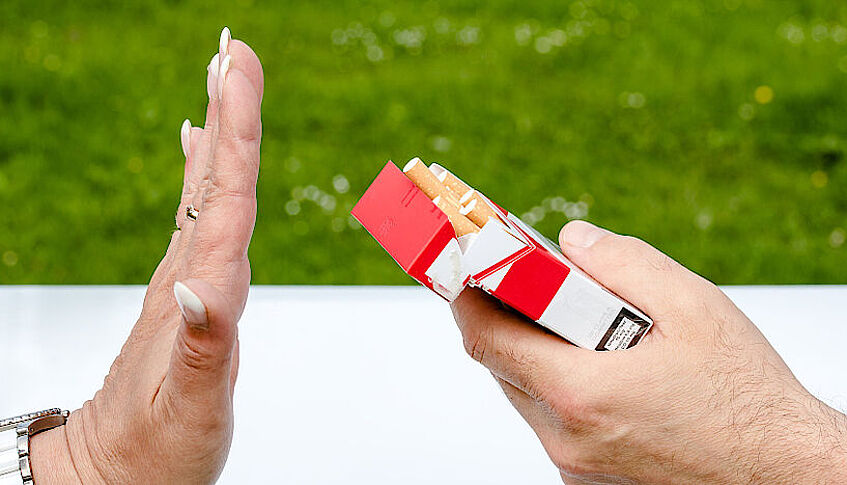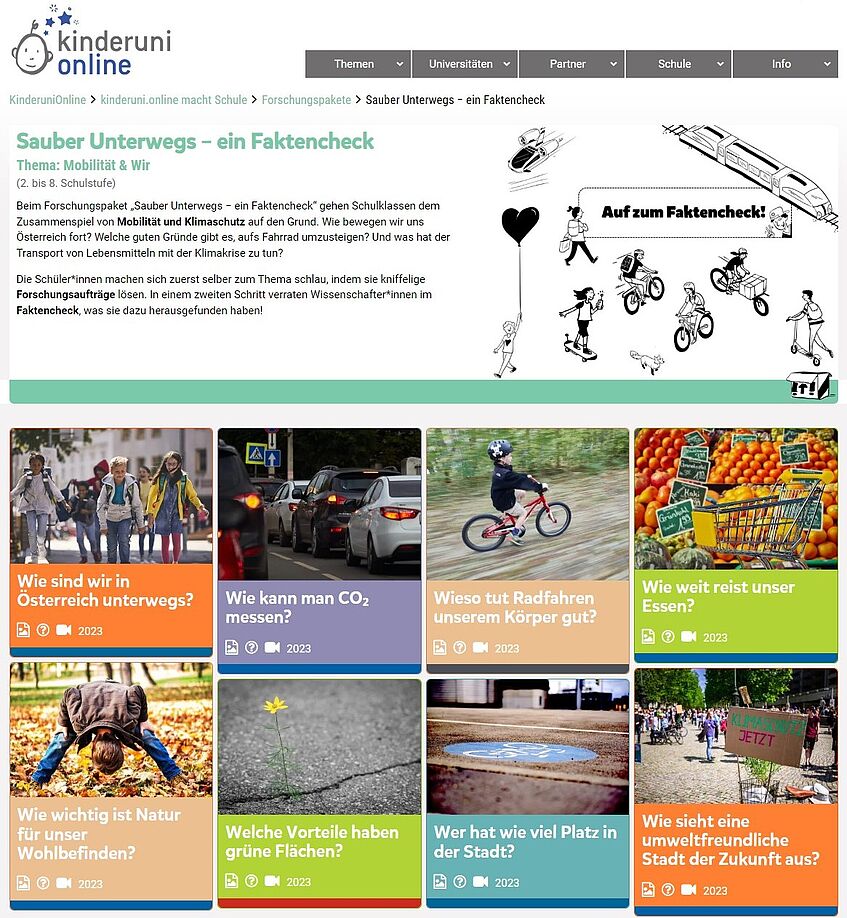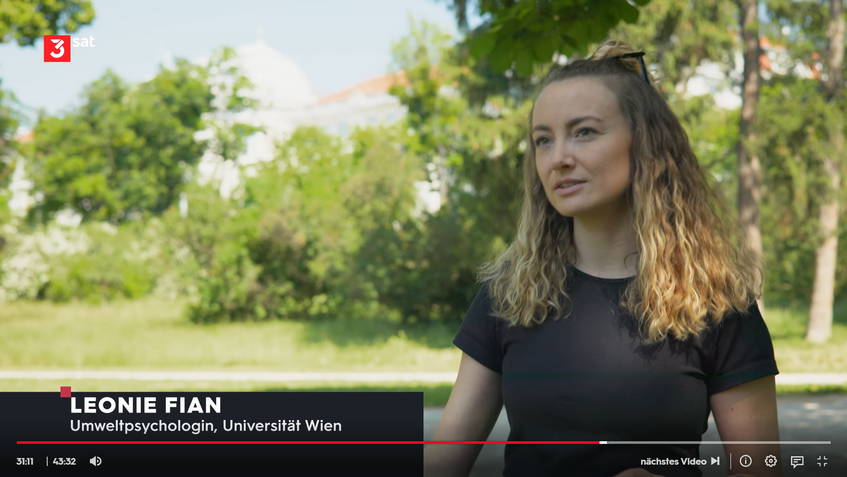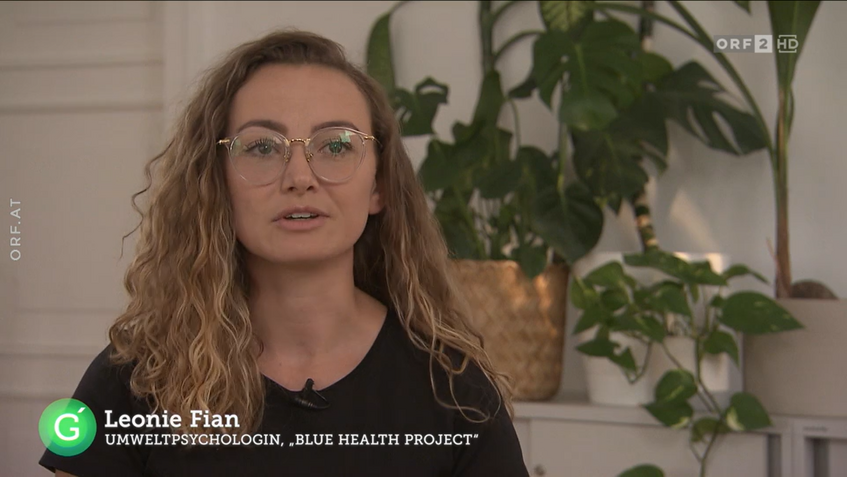Our warmest congratulations! Cornelia Ehmayer-Rosinak has won the €3,000 teaching prize of the Faculty of Psychology at the University of Vienna for her application seminar on urban psychology (in the category "There is nothing more practical than a good theory"). There were many nominations for this prize - psychology is clearly a discipline between basic and applied research, and students also want practical relevance. We are delighted that Cornelia is such a wonderful addition to the Environmental Psychology group as an affiliate member, and that @Leonie Fian made the original link between the www.stadtpsychologie.at and @envpsych!
#TeachingAward
#EnvironmentalPsychology
Media & press
March 2025
Ever wondered why swimming in open waters makes you feel so good?
New research from the Blue Health project, using data from 1,200 swimmers across 19 countries, found that swimming in natural waters is linked to significantly higher levels of wellbeing compared to swimming in open-air pools. The study, grounded in self-determination theory, suggests that the key to this effect lies in autonomy and competence - feeling free & capable in nature. However, more skilled swimmers in riskier locations sometimes reported higher anxiety, pushing them into situations that challenge their comfort zones. These findings highlight the need for safe access to high-quality open-water sites. The article is OpenAcces and was published in Journal of Environmental Psychology here: The psychological benefits of open-water (wild) swimming: Exploring a self-determination approach using a 19-country sample - ScienceDirect
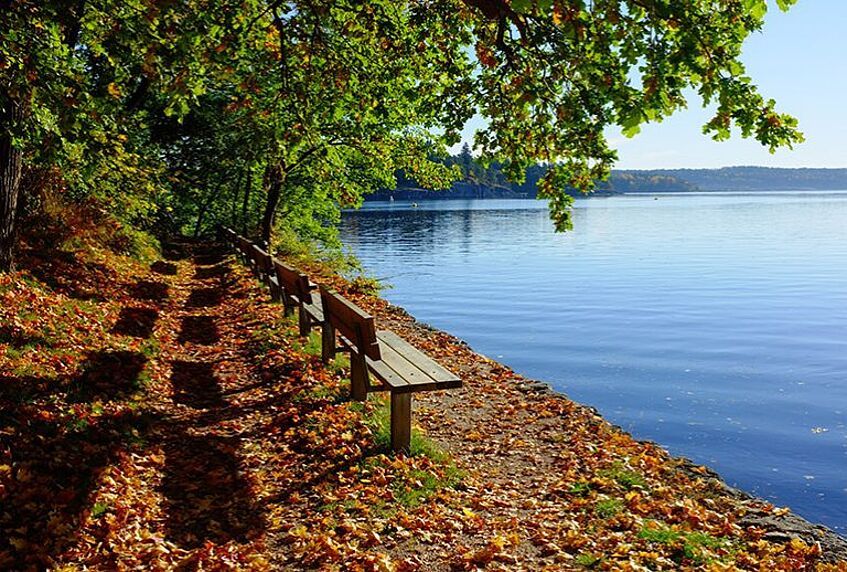
March 2025
Can nature relieve pain?
Our latest preregistered neuroimaging study, now out in Nature Communications, suggests it can. We find that virtual nature exposure reduces both subjective and neural pain responses, even when compared to matched control environments. Using fMRI, we show that watching virtual nature reduced activation in a highly sensitive neural pain marker (NPS) and several key brain regions (thalamus, S2, pINS). Contrary to typical placebo research findings, nature acted directly on sensory, and not emotional/motivational, aspects of pain. In line with past research, nature was linked to reduced self-reported pain. Addressing limitations of prior studies, we compared virtual nature to a matched urban and an additional indoor scene – both associated with higher subjective and neural pain responses. The analgesic effect wasn’t just due to pitting nature against aversive or unmatched comparators. Consistent with our neural findings, which point to attention-based mechanisms rather than belief-driven effects, nature may effectively shift attention away from pain and towards our surroundings. Nature isn’t just relaxing – it can actively reduce pain, both on a subjective and a neural level. Thus, nature-based interventions may offer a promising way to complement pain management strategies, even when using virtual instead of real-world nature.
Click here to listen to the BBC podcast, and here to access the full article.
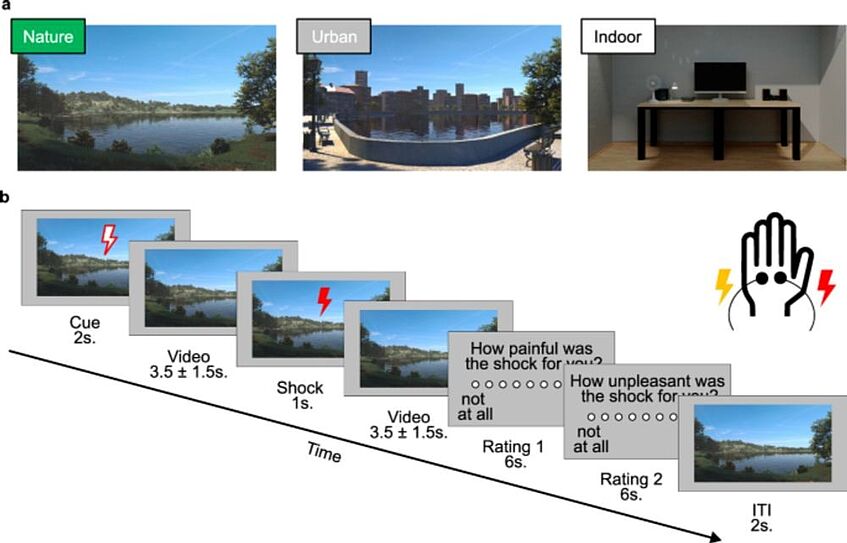
November 2024
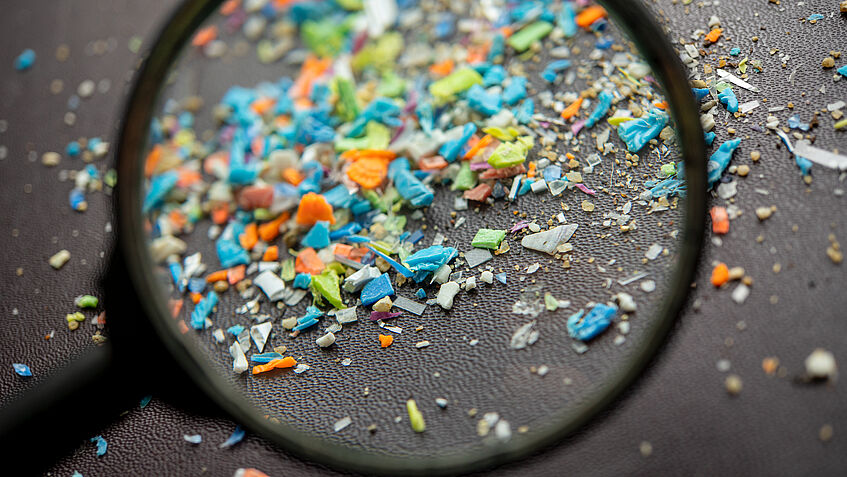
November 2024
New study on involved group’s perceptions of microplastics in food
In a new study led by Leonie Fian from the EnvPsy team, interviews with different groups involved in the ‘farm-to-fork’ food chain (i.e., harvesting, production, packaging, distribution, consumption, policy making) were conducted to find out more about their knowledge and perceptions of microplastics in the human food chain and potential solutions. Bottom line: more needs to be done to systematically include involved groups in solution-finding initiatives!
The study has just been published in Journal of Risk Research and the article can be found here.
November 2024
Psychology: What makes scientists trustworthy?
Dr Nina Vaupotic was involved in a study on ‘intellectual modesty’ at the University of Pittsburgh.
According to the new study, this modesty increases the trustworthiness of scientists in society. The results were recently published in the renowned journal Nature Human Behaviour.
Read the article on the media portal of the University of Vienna (in German).
November 2024
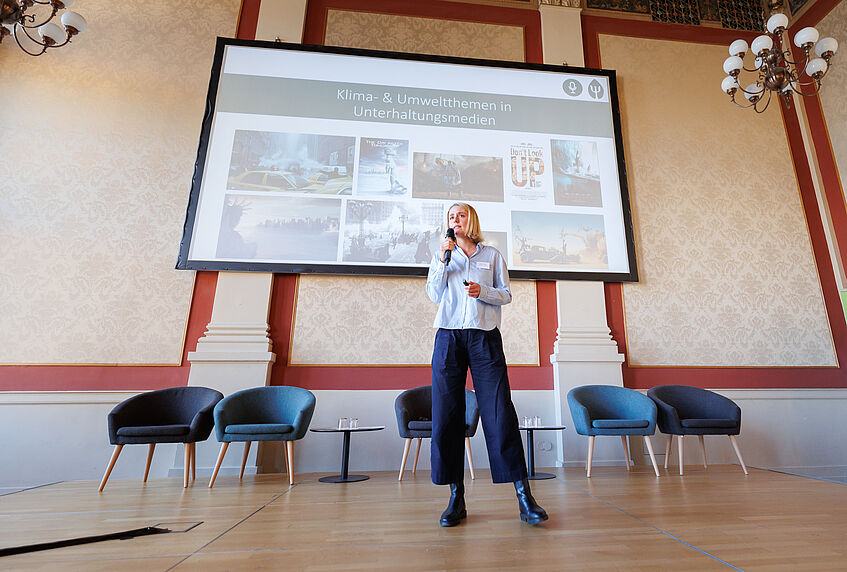
November 2024
Pitch Your Thesis: Isolde Gottwald presents her thesis on climate and sustainability
Presenting highly complex topics in an exciting way in just a few minutes: Five selected graduates, including Isolde Gottwald from the Environmental Psychology Group, showed how this works at “Pitch Your Thesis” on November 4 using their Master's theses. "Alternative communication strategies need to be developed that incorporate the findings of psychological research in order to promote engagement instead of reinforcing fear and rejection. The aim of this research is to provide new impetus for narratives in entertainment media that depict the complex challenges of our time in such a way that they inspire people and motivate them to take action.", proclaims the young researcher.
At this occasion, Prof. Sabine Pahl acted as commentator on Isolde Gottwald´s thesis, as thesis tutor to represent the perspective of lecturers, and as representative of ECH to hand over certificates together with vice-principal Christa Schnabl.
Access the on-line article (in German) here and the video here.
September 2024

September 2024
New press article: Sabine Pahl in SCIENCE
The current article was written on the occasion of the 20th anniversary of the first study on microplastics, which was also published in the journal Science and coined the term ‘microplastics’ to describe the microscopically small plastic fragments in our oceans. Both studies were led by the ‘Godfather of Microplastic’, Richard Thompson, head of the International Marine Litter Research Unit at the University of Plymouth. International experts from the UK, Switzerland, Australia and the Netherlands also contributed to the study.
Access the full on-line article here.
September 2024
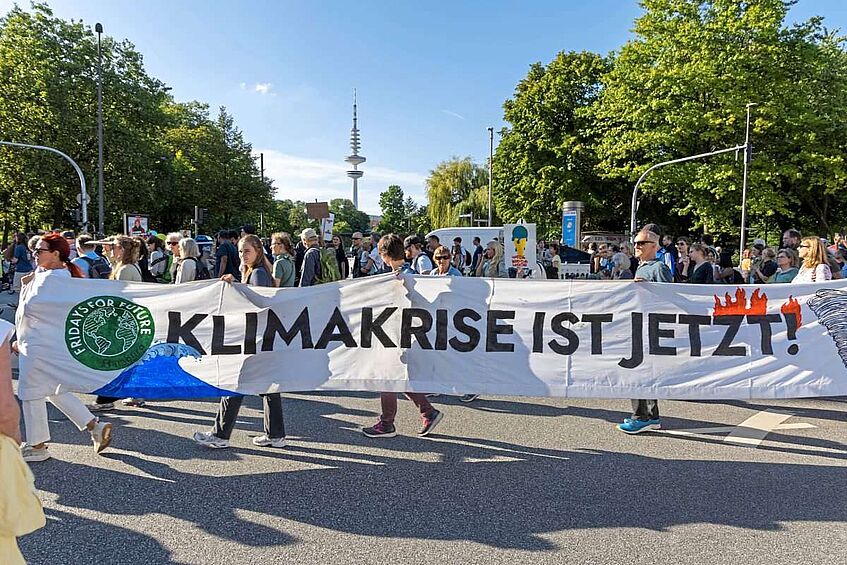
September 2024
New press article: Jana Köhler in derSTANDARD
Climate change triggers strong emotions, and not just after extreme events such as storms. Young people usually suffer the most. But there are ways to relieve your own psyche.
Access the full on-line article (in German) here.
September 2024
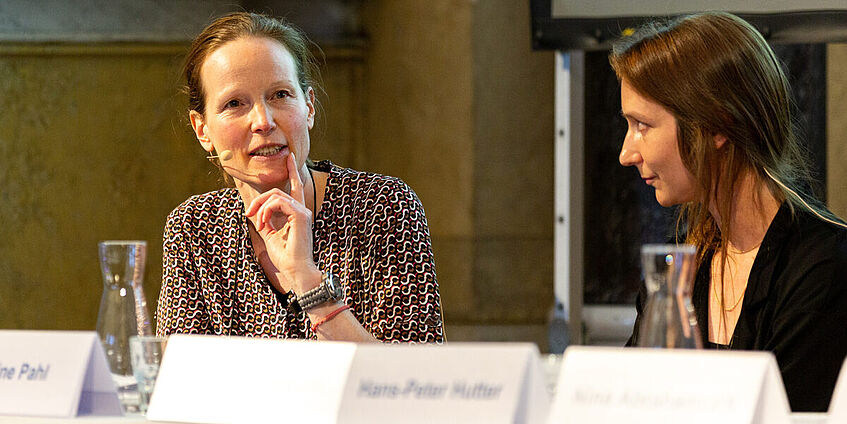
September 2024
ECH Director Sabine Pahl at the Largest Scientific Psychology Congress in the DACH Region
On September 16, 2024, the 53rd Congress of the German Psychological Society will commence at the University of Vienna. Under the motto “People – Environment – Media”, over 2,500 scientists from across the DACH region will discuss how psychological findings can contribute to overcoming global challenges.
On the opening day, Sabine Pahl, environmental psychologist and co-director of the ECH, will give a central keynote speech. Her topic: How human decisions around plastic contribute to environmental pollution – and how social science findings and political measures can help to sustainably reduce plastic waste.
Pahl will summarize findings from over ten years of research and policy work. The focus will be on the perception of risks, support for political measures and behavioral changes. “My presentation will draw on interdisciplinary and international work to highlight the challenges of such integrative and applied research,” says Pahl, emphasizing a scientific approach that transcends the boundaries of individual disciplines, which the ECH also stands for.
You can view the congress agenda on their website.
September 2024
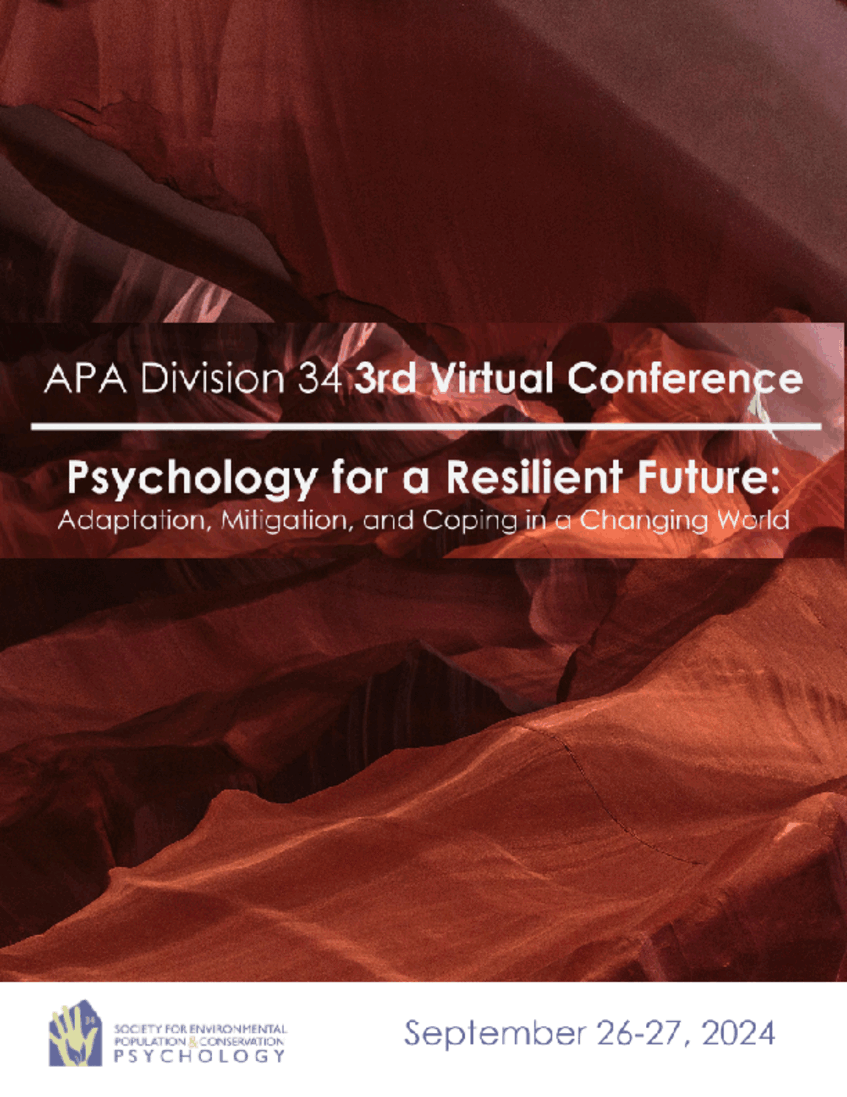
September 2024
Conference Announcement: Psychology for a Resilient Future - Adaptation, Mitigation, and Coping in a Changing World
The APA Division 34 is hosting its 3rd Annual Virtual Conference.
Members of the Environmental Psychology Group of the University of Vienna will extensively be represented.
Click here to acces the Society´s website: www.apadivisions.org/division-34/news-events/2024-annual-virtual-conference
August 2024
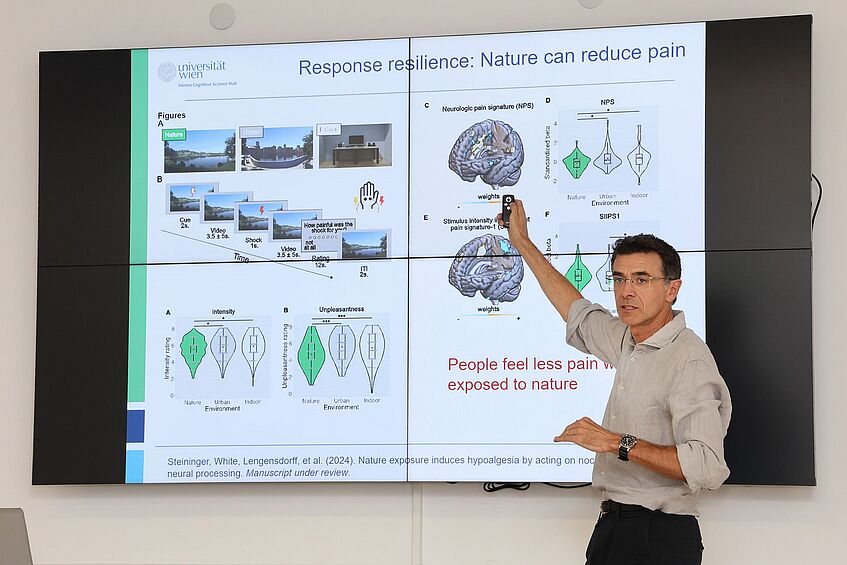
August 2024
Visit to the MU-Plovdiv
Dr. Mathew White presented the essence and scope of the RESONATE project, which aims to investigate the links between contact with nature, its therapeutic benefits and biopsychosocial resilience of individuals and communities to stressors in different centres across Europe.
Click here to read the full article: https://mu-plovdiv.bg/en/researchers-from-the-university-of-vienna-visited-mu-plovdiv-under-the-resonate-project/
Source: Medical University of Plovdiv, mu-plovdiv.bg/en/
June 2024
DOCK for Change – Climate Conference
„Stadtnatur zum Staunen“ (Engl.: Amazing urban nature) was the motto of the DOCK for Change – Climate conference of the University of Vienna’s Kinderbüro, where 93 “Change Agents” between the ages of 8 and 10 presented their vision of a good future. In a year-long co-creative participatory process, a 10 point manifesto was developed and presented to an audience of experts, entrepreneurs, educators and politicians at the conference. Parts of the EnvPsy Vienna team were also involved in the process, and Sabine Pahl and Leonie Fian took part in the final conference.
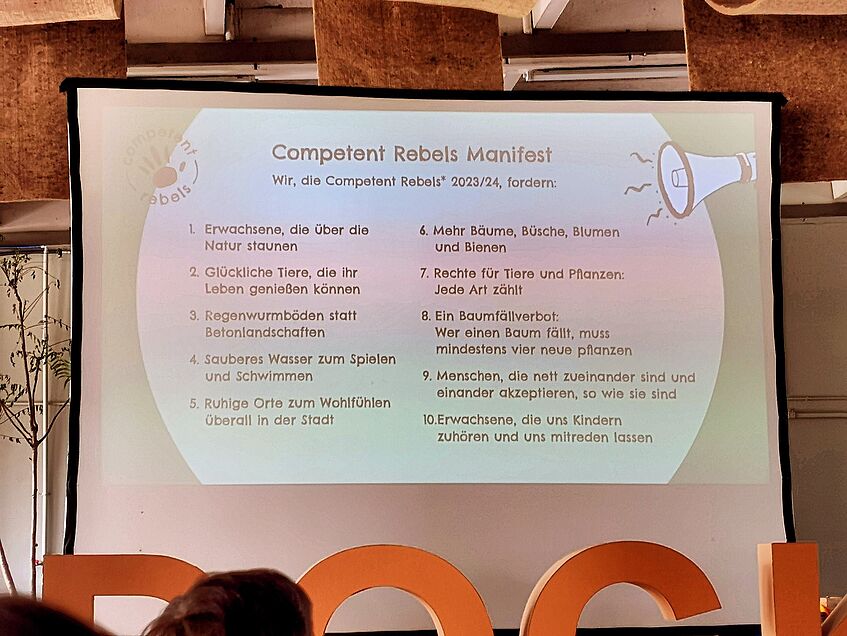
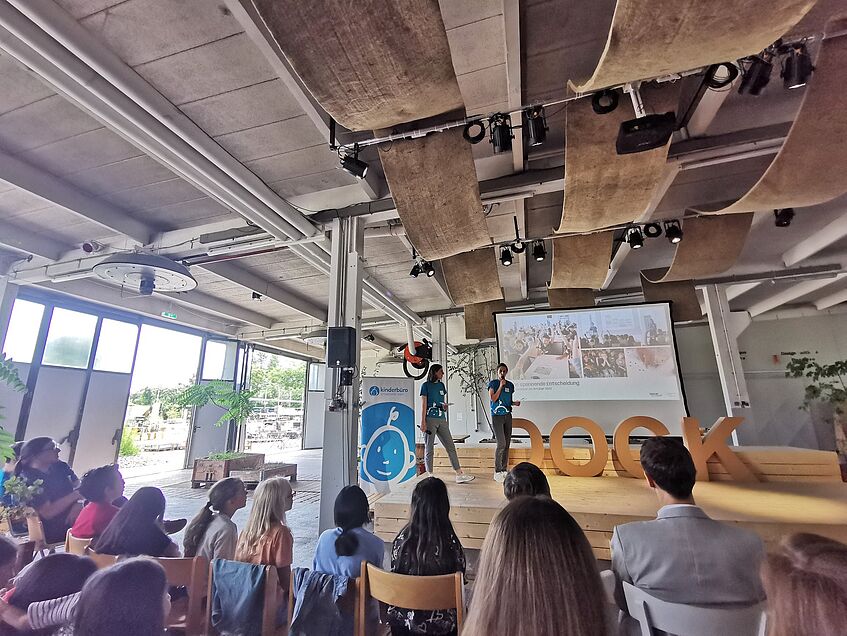
June 2024
Teaching Award of the Faculty of Psychology
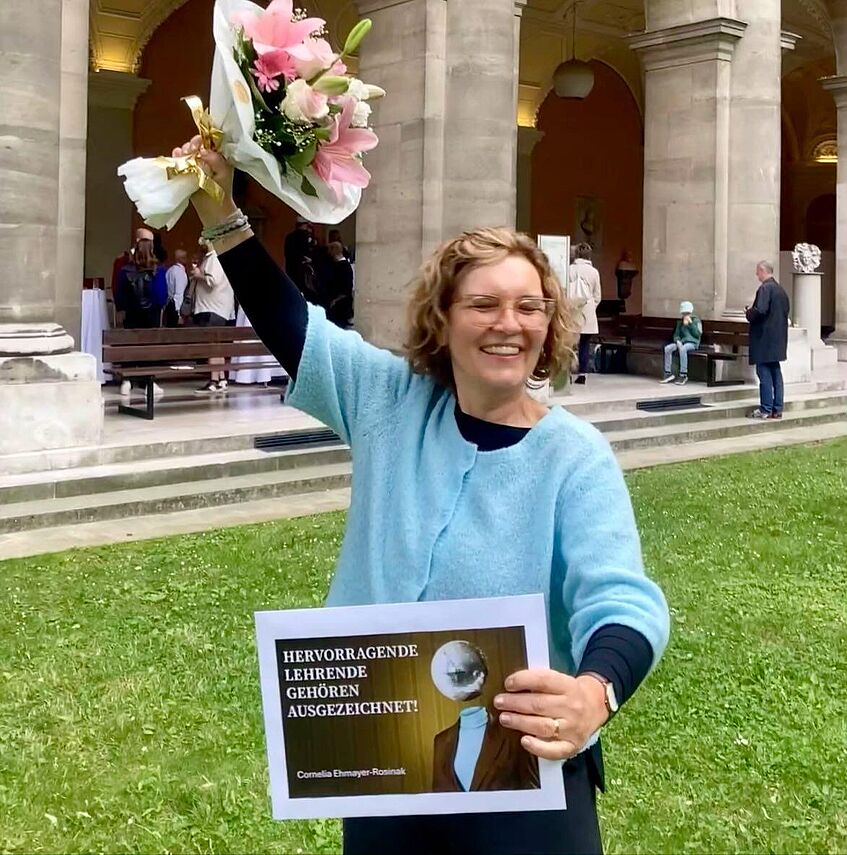
May 2024
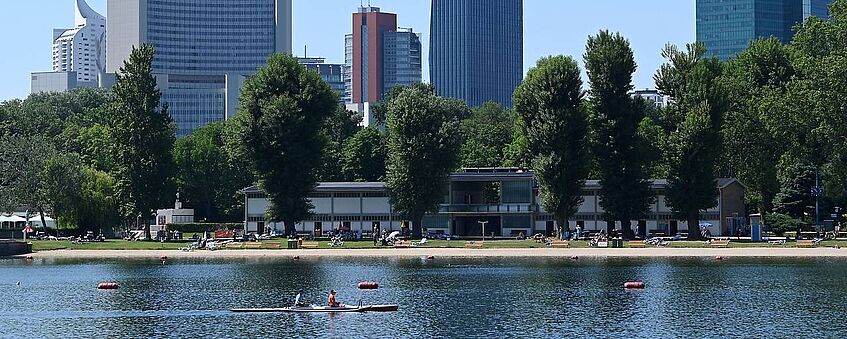
May 2024
Heat stress in cities is unevenly distributed
People on lower incomes in cities suffer particularly from heatwaves. Researchers at the University of Vienna are calling for more attention to be paid to social inequalities in future adaptation measures such as the greening of streets and squares.
Click here to read the full article (report in German): https://science.orf.at/stories/3225223/
to read the article in English click here
Source: red, science.ORF.at/Agenturen
March 2024
Sari Nijssen is the new “Post Doc” brand ambassador for the University of Vienna’s employer branding campaign
Sari Nijssen, postdoc in the Urban and Environmental Psychology group, is the new brand ambassador for the University of Vienna's employer branding campaign. She is featured taking a “deep dive” in science. With this new campaign, the University of Vienna wants to emphasize its four central pillars: space for personal growth, space for added social value, space for growing aspiration, and space for open cooperation. Sari Nijssen explains why she joined the campaign in this video (u:wiki access only: https://wiki.univie.ac.at/pages/viewpage.action?pageId=346765117) If you are interested in joining the University of Vienna, you can check out the campaign and learn about the university as an employer on the university jobs.
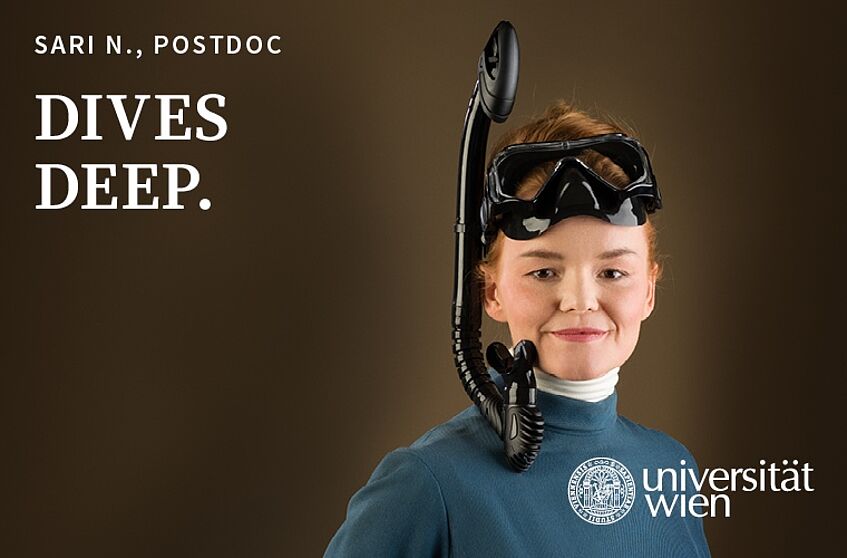
December 2023
Contribution for „kinderuni.online macht Schule“
As part of the "kinderuni.online macht Schule" programme, research packages for school classes are developed together with school children and scientists from various disciplines. The new research package "Sauber Unterwegs - ein Faktencheck" on the interplay between mobility and climate protection also includes a contribution from our colleague Leonie Fian on the topic: "How important is nature for our well-being?" The research package is freely accessible and can be used by teachers from 2nd to 8th grade. Click here for the research package: https://kinderuni.online/forschungspaket/mobilitaet/
October 2023
Leonie Fian in the 3sat TV-documentary “Die Magie der Vögel – Was Birdwatcher begeistert”
As part of the 3sat documentary “Die Magie der Vögel – Was Birdwatcher begeister” by Mario Kreuzer and Leander Khil, our team member Leonie Fian was interviewed about positive effects of nature contact on human health and well-being, and in particular, the special role of birds. The documentary can be watched online until 25.01.2024: https://www.3sat.de/dokumentation/tiere/die-magie-der-voegel-was-birdwatcher-begeistert-100.html
October 2023
Leonie Fian in the Austrian ORF2 documentary format “G’sund in Österreich”
Our team member Leonie Fian was interviewed for the Austrian ORF2 documentary format “G’sund in Österreich” about findings of the “Blue Health” project, in particular about the potential of blue spaces for improved health and well-being. You can watch the documentary online until October, 30th: tvthek.orf.at/topic/Gesundheit-Lifestyle/13869354/Gsund-in-Oesterreich-Wasser-Urkraft-und-Lebenselixier/14198506
October 2023
Leonie Fian interviewed for the DATUM magazine
Our colleague Leonie Fian was interviewed by Katharina Brunner for the current issue of DATUM magazine on the human-nature relationship. In the article "Beziehungskrise" she talks about nature connectedness and nature contact, also in the context of increasing urbanisation, and why the human-nature relationship is political.
Find more information about Leonie Fian and her research here!
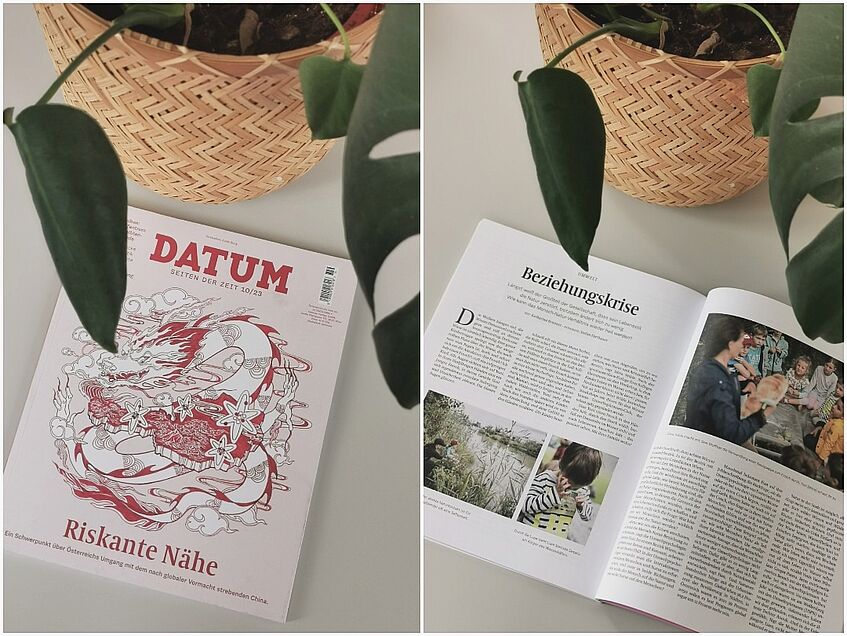
September 2023
Maja Grünzner in the Austrian ORF2 news format "Aktuell nach 1"
Maja Grünzner was invited to report on the Austrian ORF2 news format “Aktuell nach 1” about the potential reasons for the current increase in second hand purchases. She mentioned that price plays a role and that an increase in second-hand purchases has already been taking place since 2019 in Austria. Clothing was the most frequently purchased product.
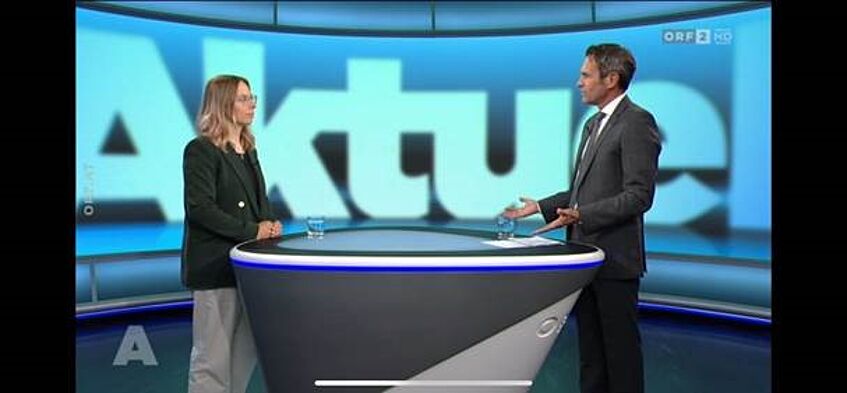
June 2023
"Everyone seems to benefit from the proximity to the sea, not only the wealthy.“
Sandra Geiger reports to science.ORF.at about the EU project SOHPIE, in which the opportunities and risks of oceans for human health are being researched. The project, led by Prof. Dr. Lora Fleming, surveyed more than 15,000 people in 14 European countries and Australia. "People are healthier if they live near the sea or spend at least some time by the sea," Geiger summarises the results.

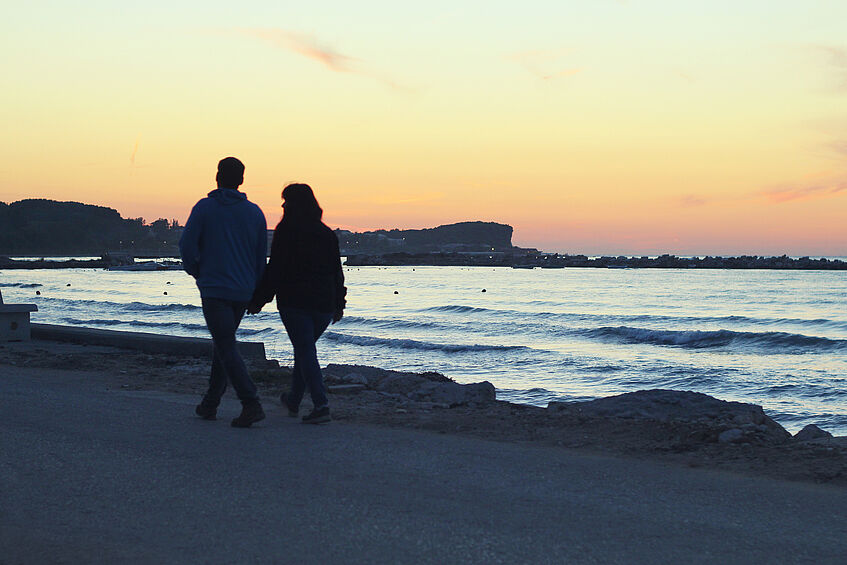
February 2023
Reactions to climate protests
Sabine Pahl and Thomas Slunecko talk in the Wiener Zeitung about reasons for aggressive reactions of car drivers to the climate protests of the Last Generation.
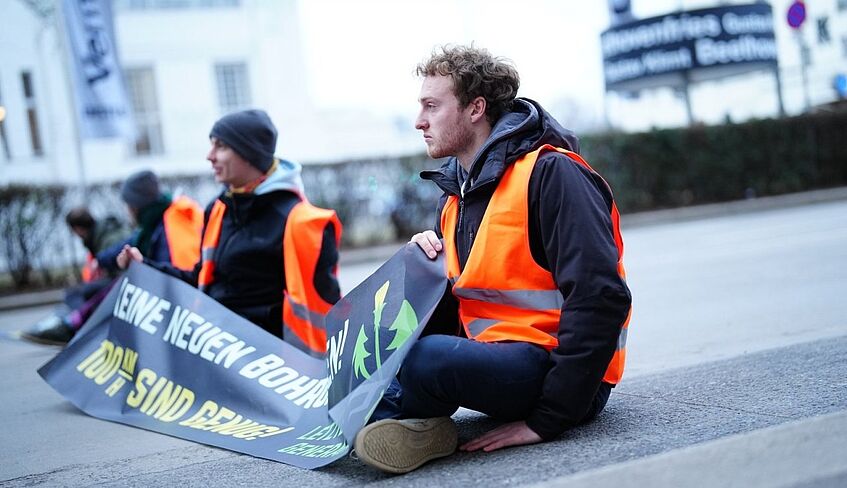
January 2023
Vienna ZeroPM WP2 team presents its work
The overall goal of the project Zero pollution of Persistent, Mobile substances (ZeroPM) is to protect water from contamination by persistent, mobile substances. As part of work package 2, Ellise Suffill, Mat White and Sabine Pahl will assess the knowledge, perceptions and behaviour of different groups in relation to PFAS and other persistent and mobile substances.
In this short video Mat and Ellise give an impression of their work for ZeroPM.
FInd more videos about ZeroPM here.
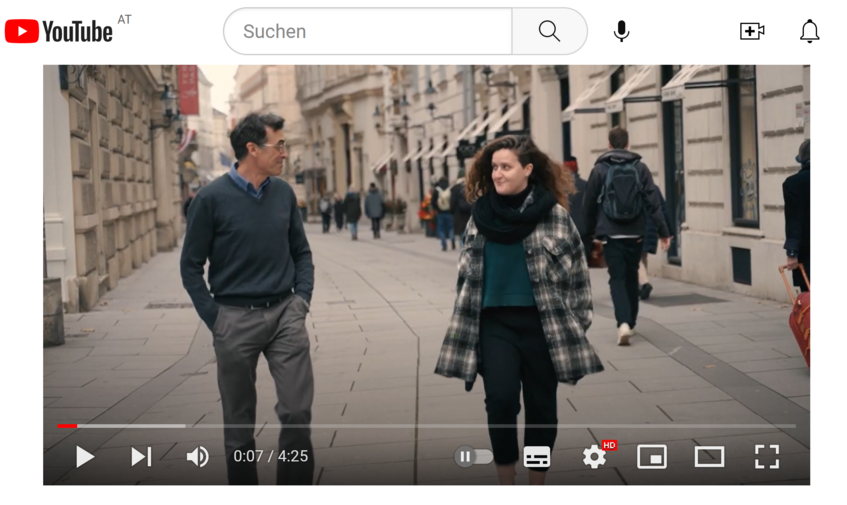
December 2022
Der Fuß wird zur Hand - The foot becomes a hand
Dr. Sari Nijssen about the Ecological Handprint
Our colleague Dr. Sari Nijssen commented on the new concept of the ecological handprint in the Edition Zukunft - the future issues department of The Standard. In the article "The foot becomes the hand", she explained that it could be a more effective tool for motivating environmentally friendly behavior than the ecological footprint.
Find here more infos about Sari Nijssen and her research!
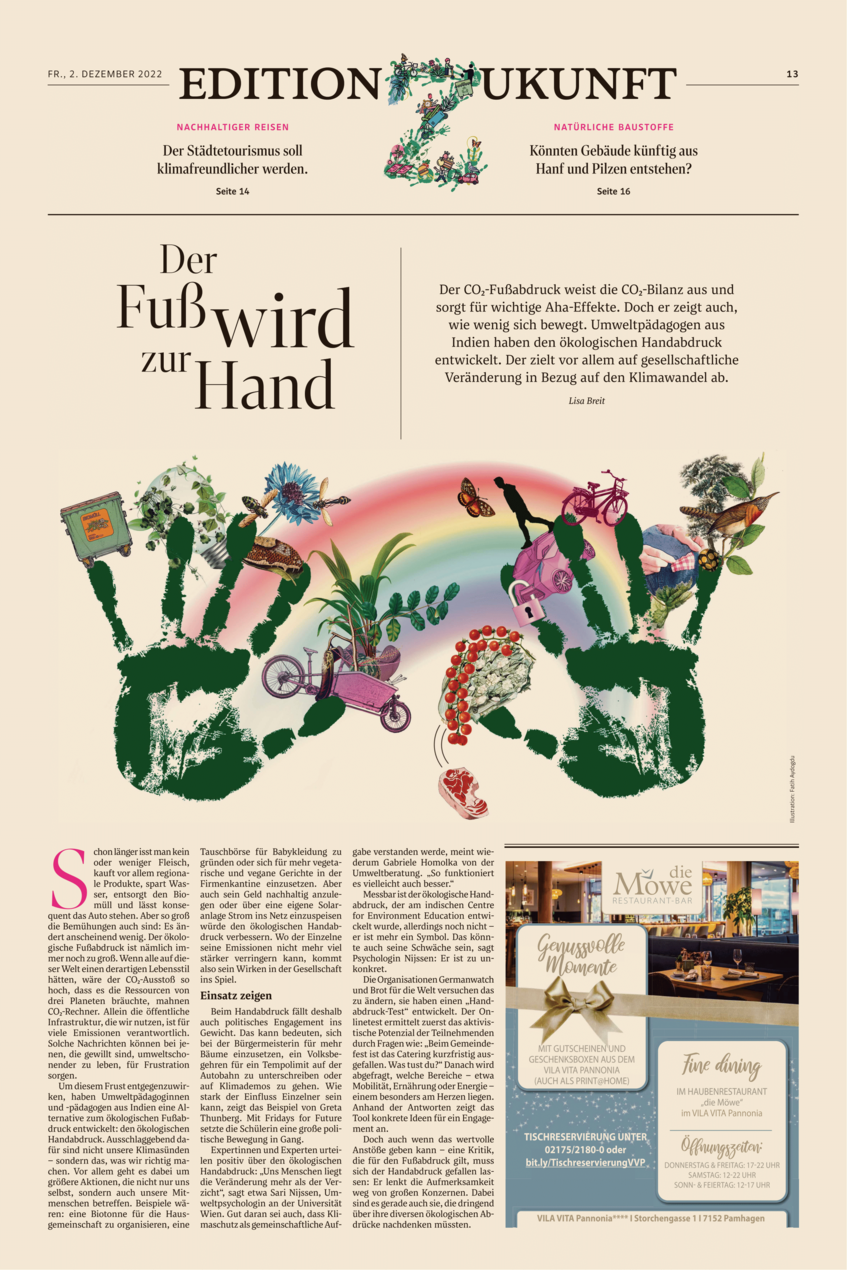
July 2022
Report on Climate Change in Austria
At the University of Innsbruck on July 6th the authors gathered for a first major working meeting. In a press conference information was provided about the report, its structure and objectives.
The AAR2 (APCC Assessment Report on Climate Change in Austria) is to be completed in 2025 and its results are to make a significant contribution to Austria's path to climate neutrality in 2040.
Sabine Pahl, environmental psychologist at the University of Vienna and one of the co-authors, is "excited to be part of this effort. Social and behavioural science perspectives can make crucial contributions to dealing with climate change and the report is very serious about integrating these different perspectives"
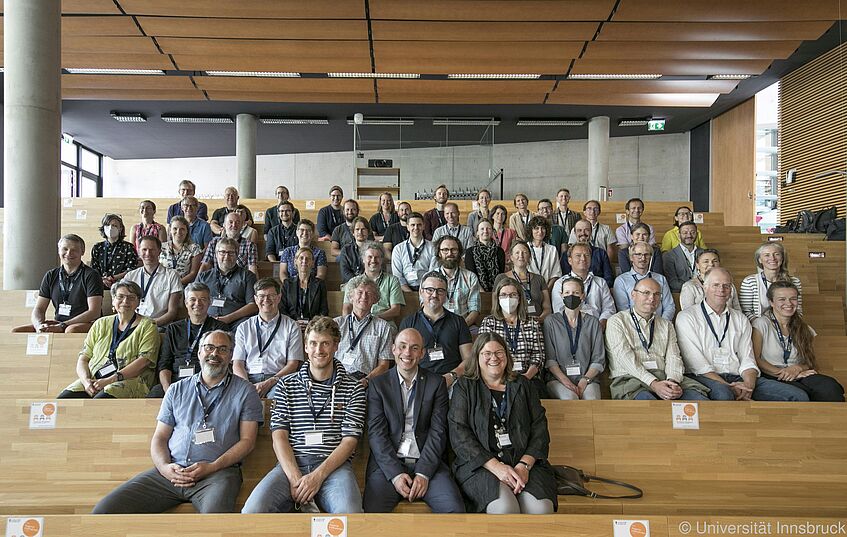
July 2022
Instabile Wirtschaftslage verstärkt Tendenz zum "Spatz in der Hand"
In the latest article by the Austrian Press Agency (APA), Sandra Geiger talks about the phenomenon that people around the world (including Austria) prefer smaller, immediate gains over larger, delayed ones. She also provides insights into how this phenomenon--known as temporal discounting--is related to economic inequality, low income, and inflation, based on a recently published study across 61 countries.
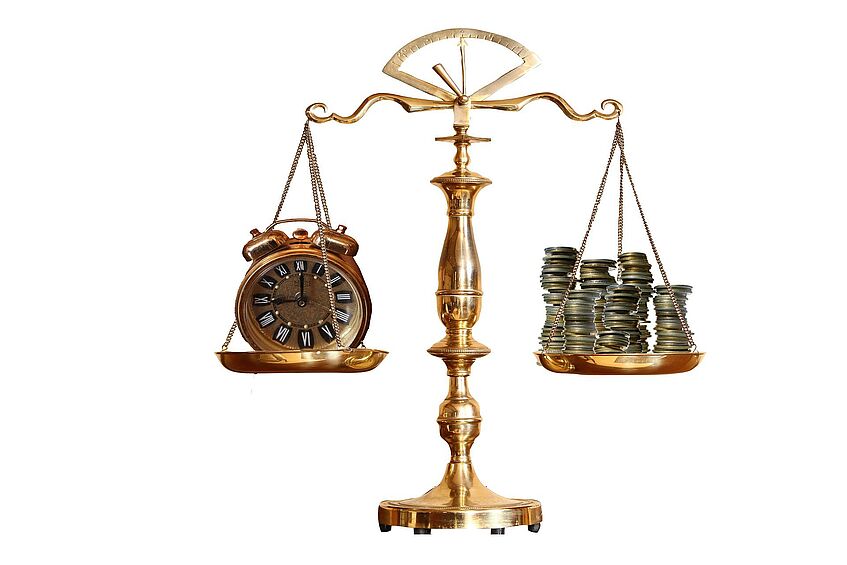
February 2022
"Hör mal wer die Welt verändert" podcast
In the latest episode of “Hör mal wer die Welt verändert“, a podcast by students of BOKU, environmental psychologist Sabine Pahl provides insights into current research topics. Also, Leonie Fian from the EnvPsy Vienna group talks together with Elena Sessig about their work at the Network for Psychology and the Environment (NEPU). Have fun listening!
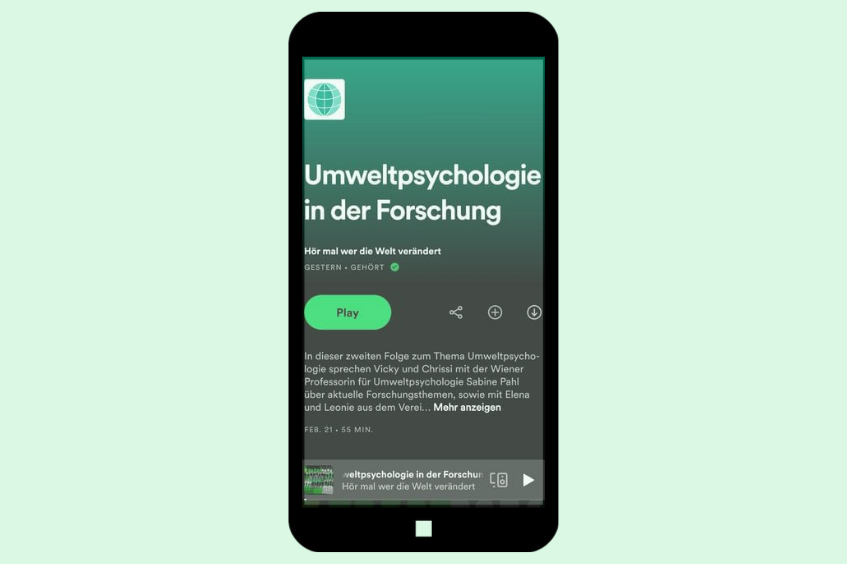
July 2021
Audimax Podcast: "Humans have irreversibly changed the Earth"
In the latest edition of Audimax, the podcast of the University of Vienna, environmental psychologist Sabine Pahl talks about the impact of the environment on the human psyche, what influence humans have on their environment in reverse, and why she is optimistic about future challenges.
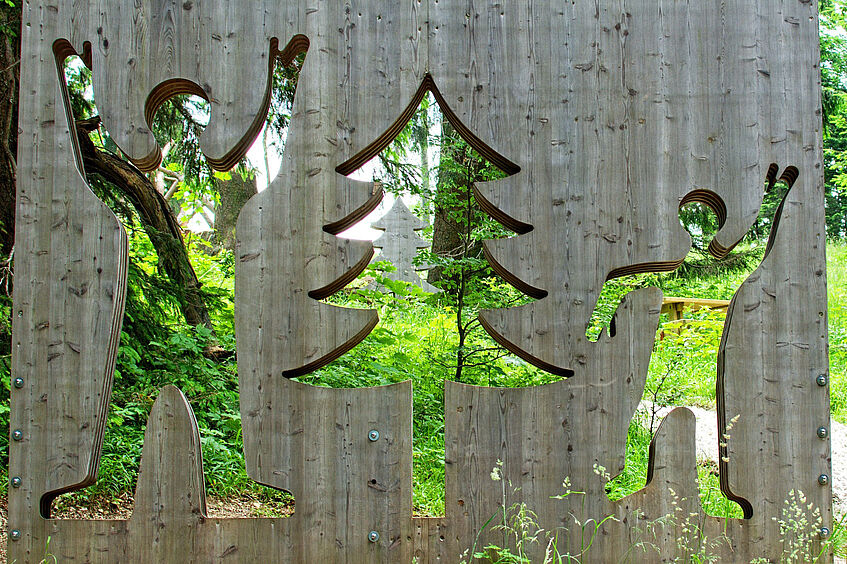
June 2021
Why trash on the street bothers us so much
In the STANDARD podcast "Edition Zukunft" Sabine Pahl talks about the environmental psychological factors of waste disposal, recycling and pollution.
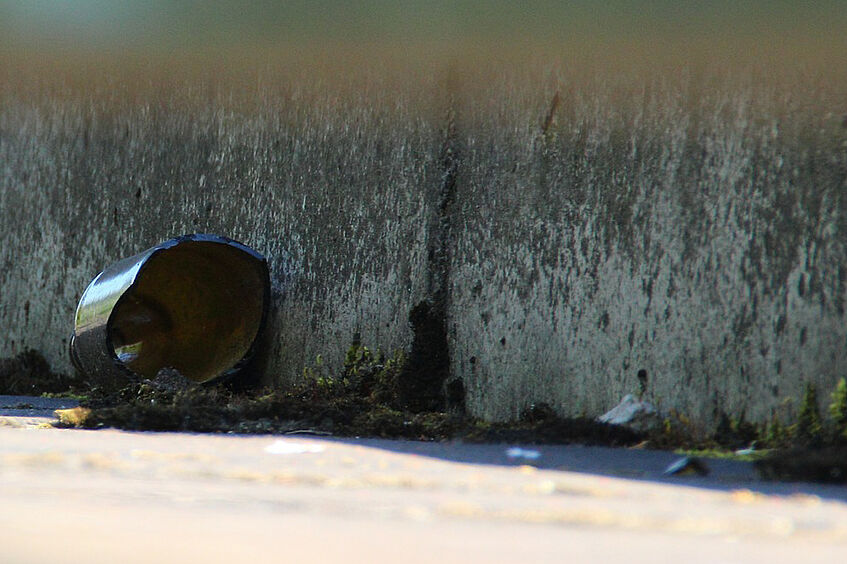
May 2021
Blue Space Is the New Green Space
An article by Dan Rubinstein, which reflects on why being near water can be a boon for our health and wellness. It draws heavily on the research by group member Mat White.
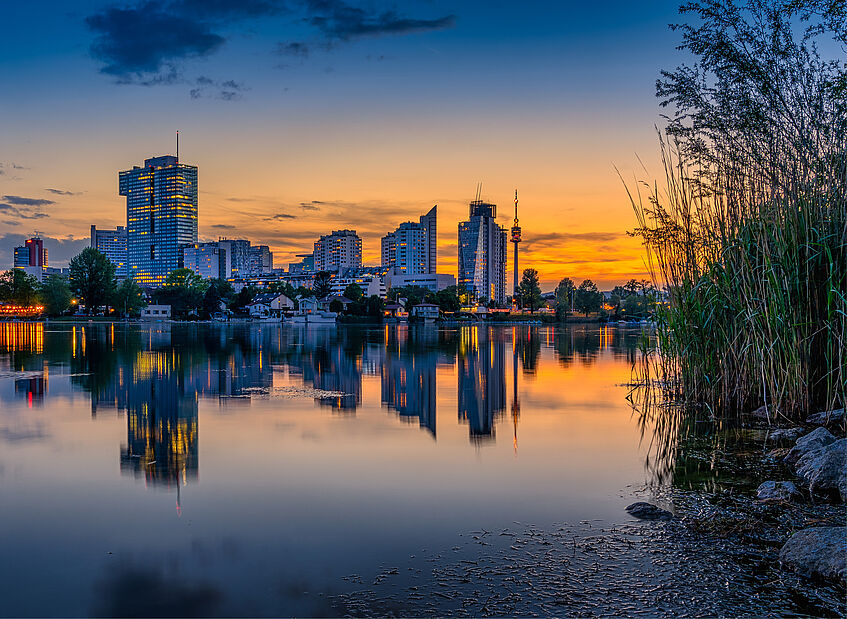
April 2021
How much of a nuisance is the aluminium can at the roadside?
In a user article in DER STANDARD, environmental psychologist Sabine Pahl discusses the psychological components of human littering behaviour. Countless users diligently commented on the article and shared their experiences and assessments.
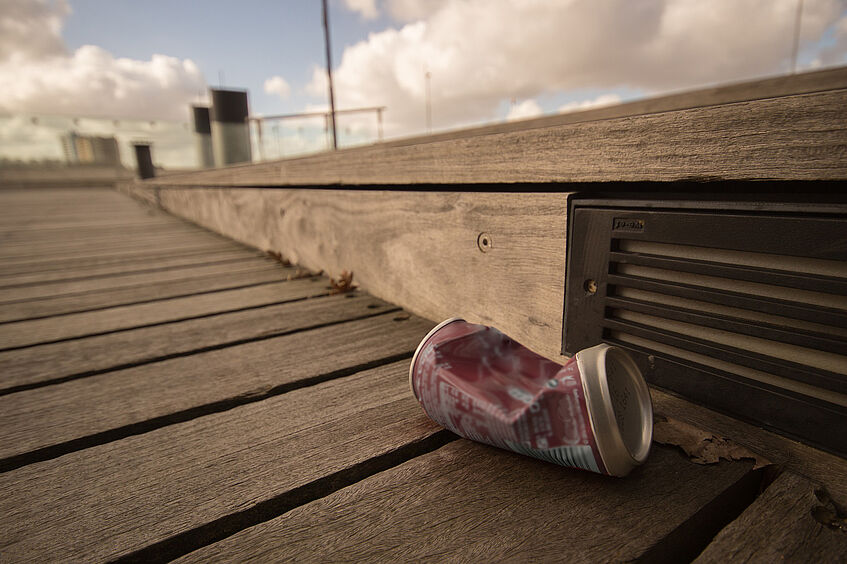
March 2021
Avoiding waste must become easier
Many people are concerned about the amount of plastic waste in the environment, says environmental psychologist Sabine Pahl. But they need support in avoiding it: Whether packaging is recyclable must be more visible. And the industry needs stricter guidelines.
→ ORF
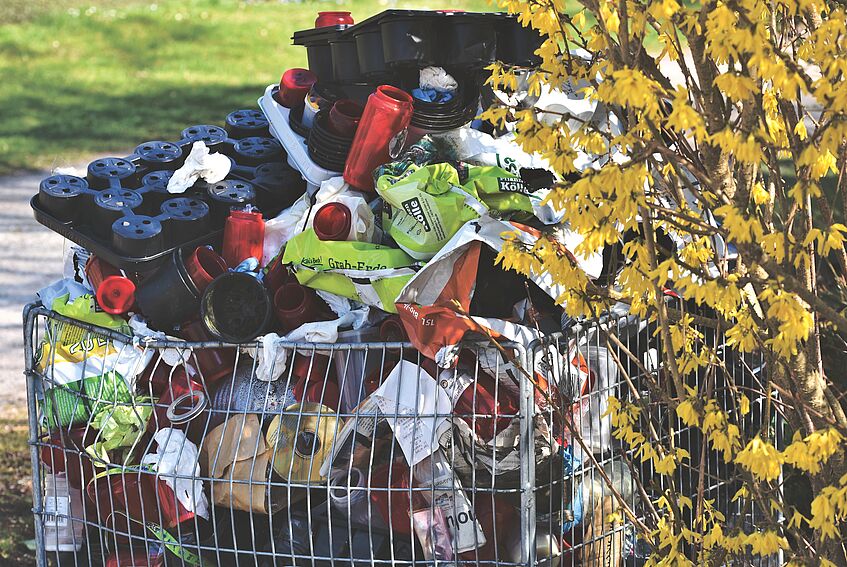
November 2020
People smoke less when they live in green areas
A recent study involving psychologists Sabine Pahl and Mathew White from the University of Vienna has found that people smoke less when they live in a green area. The research data is based on responses from more than 8,000 adults to questions about their health, where they live and various other lifestyle factors collected as part of the Health Survey for England (HSE). The findings appear in Social Science & Medicine.
→ Medienportal der Universität Wien
→ ORF
→ Vienna.at
